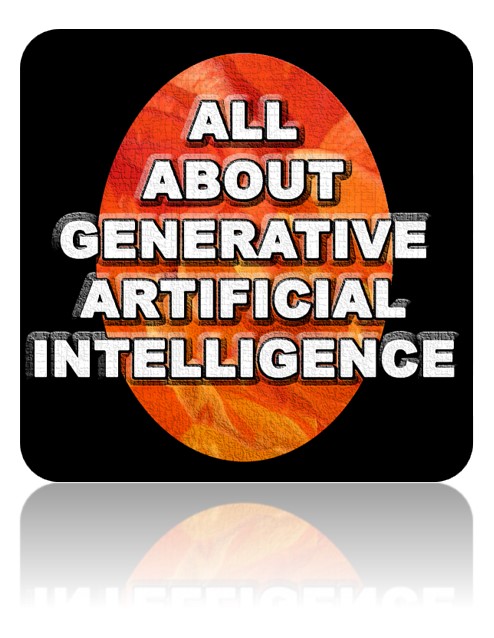Introduction To Diagnostic AI
Articles Series: All About Generative Artificial Intelligence
Conversation With Chat GPT4 18 January 2024

F McCullough Copyright 2023 ©
Article Overview
This overview explains Diagnostic AI, a technology used in
healthcare to aid in disease diagnosis, leveraging machine learning and data
analysis. It highlights its applications, challenges, and ethical
considerations.
Introduction To Diagnostic AI
Diagnostic Artificial Intelligence (AI) refers to the
application of artificial intelligence technology in the field of healthcare,
specifically for the purpose of aiding in diagnosing diseases and medical
conditions. This technology utilises machine learning algorithms, which are
designed to analyse patterns in data, and applies these to medical diagnostics.
Essentially, it's like having a highly advanced, data-driven assistant for
doctors and medical professionals.
Key Components Of Diagnostic AI
Machine Learning
Machine Learning is a subset of AI where computers learn
from data. They recognise patterns and make decisions with minimal human
intervention. In the context of diagnostic AI, machine learning algorithms can
learn from vast amounts of medical data, such as scans, blood tests, and
patient histories, to help identify diseases.
Neural Networks
Neural Networks are a type of machine learning model
inspired by the human brain. They consist of layers of interconnected nodes
that process data in a manner similar to how neurons process signals in our
brain. In diagnostics, these networks can analyse complex medical images, like
MRI scans, to detect anomalies.
Data Analysis
Data Analysis in diagnostic AI involves the examination of
large volumes of medical data. This can include patient records, imaging, test
results, and even genetic information. The AI system analyses this data to find
patterns that might indicate a particular medical condition.
Applications Of Diagnostic AI
Image-Based Diagnostics
AI systems are particularly adept at analysing medical
images such as X-rays, CT scans, and MRIs. They can detect abnormalities, like
tumours, faster and sometimes more accurately than human radiologists.
Predictive Diagnostics
Predictive Diagnostics involves forecasting the likelihood
of diseases before they manifest symptoms. AI algorithms can analyse patient
data to predict risks for conditions like heart disease or diabetes, enabling
preventive healthcare.
Personalised Medicine
AI can help in developing personalised treatment plans. By
analysing a patientís unique health data, AI can recommend the most effective
treatments tailored to the individualís specific health needs.
Challenges & Ethical Considerations
Data Privacy
Handling sensitive medical data requires strict privacy
measures. Ensuring that patient data is securely stored and used ethically is a
major concern in the development of diagnostic AI.
Accuracy & Reliability
While AI can be incredibly accurate, it's not infallible.
Ensuring the reliability of AI diagnostics and understanding the potential for
errors is crucial for safe application in healthcare.
Integration With Healthcare Systems
Integrating AI into existing healthcare systems poses
challenges. It requires technological adaptation and also training for medical
professionals to work effectively alongside AI tools.
Concluding Overview
Diagnostic AI represents a significant advancement in
healthcare, offering the potential for more accurate, efficient, and
personalised medical diagnostics. However, it's important to navigate its
development and integration with care, considering ethical, privacy, and
reliability issues. By doing so, we can harness the power of AI to improve
healthcare outcomes for patients worldwide.
Key Takeaways
This overview explained Diagnostic AI, a technology used in healthcare to aid in disease diagnosis, leveraging machine learning and data analysis. It highlighted its applications, challenges, and ethical considerations.
Conversation with Open AIís ChatGPT4 Reviewed, Revised and Edited by F McCullough, Copyright 2023 ©
Series: All About Generative Artificial Intelligence
Other articles in the series may be found here.
Links
Agriculture
Articles
Artificial Intelligence
Business
Ecology
Education
Finance
Genomics
Goats
Health
History
Leadership
Marketing
Medicine
Museums
Photographs & Art Works
Artworks, Design & Photographs Index
Other Photographs & Art Works By F McCullough
Places To Visit
Other Museums And Places To Visit
Plants
Poetry
Research
Science & Space
Science & Space Articles & Conversations
Short Stories
Songs
Technology
Thought Of The Day
AI's potential is limited only by our imagination and commitment to ethical standards.
Information
Image Citations
- † All About Generative Artificial Intelligence F McCullough Copyright 2023 ©
Table Of Contents
Articles
Series: All About Generative Artificial Intelligence
Key
Components Of Diagnostic AI
Challenges
& Ethical Considerations
Integration
With Healthcare Systems
Series: All
About Generative Artificial Intelligence
Copyright
Keywords: AI adoption, AI applications,
AI challenges, AI ethics, AI implementation, AI innovation, AI integration, AI
models, AI readiness, AI security, AI talent development, AI technology, AI
training programs, Artificial Intelligence, Autonomous AI, Business AI
strategy, C-suite AI strategy, Collaborative AI, Corporate AI, Data governance,
Data privacy, Data processing, Ethical AI, General AI, Machine Learning,
Predictive AI, Quantum computing, Real-time AI, Responsible AI, Technological
advancement
Hashtags: #AI_adoption,
#AI_applications, #AI_challenges, #AI_ethics, #AI_implementation,
#AI_innovation, #AI_integration, #AI_models, #AI_readiness, #AI_security,
#AI_talent_development, #AI_technology, #AI_training_programs,
#Artificial_Intelligence, #Autonomous_AI, #Business_AI_strategy,
#C-suite_AI_strategy, #Collaborative_AI, #Corporate_AI, #Data_governance,
#Data_privacy, #Data_processing, #Ethical_AI, #General_AI, #Machine_Learning,
#Predictive_AI, #Quantum_computing, #Real-time_AI, #Responsible_AI, #Technological_advancement
Created: 18 January 2024
Published: 19 January 2024
Page URL: https://www.mylapshop.com/introductiontodiagnosticai.htm
